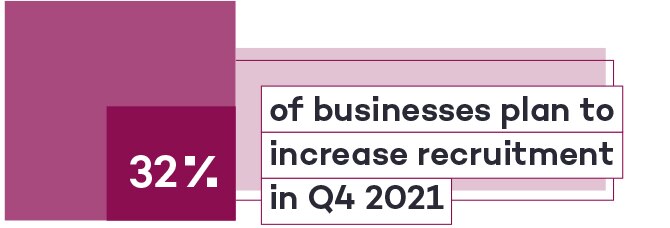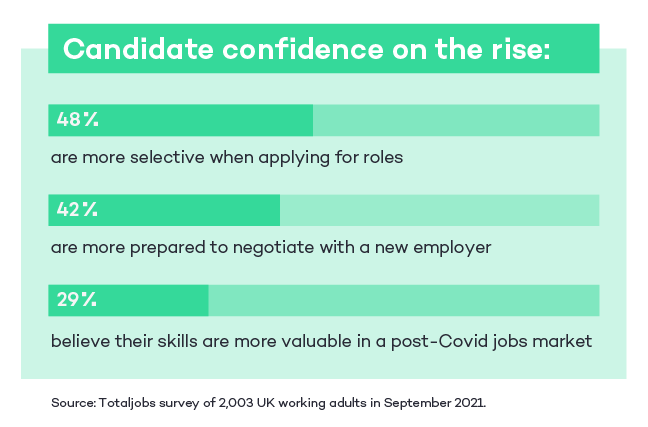Navigating record job vacancies with your recruitment
The easing of Covid-19 restrictions and consequences of Brexit has seen a surge in job vacancies across the UK, with employers fighting to hire the staff they need.
Below you can find the key trends as we delve into the stats behind record high vacancy numbers and explore what steps employers can take to recruit successfully in the months to come.

The state of play
Vacancies hit record high
At the start of Q3 2021, the UK’s job market took another turn, as growing confidence among a range of key industries saw record numbers of job vacancies.
Between July and September, there were 1.1 million jobs advertised in the UK, the highest since records began, representing an increase of 28% across the summer months – and a stark 29% up on pre-pandemic levels.
Totaljobs’ Hiring Trends Index revealed that 43% of businesses increased their in Q3, with 32% expecting to increase further before the end of the year.

Recent figures from the ONS signal that the number of employees on payroll increased by 207,000 to a record 29.2 million in September, with unemployment sitting at just 4.5% at the end of August.
What’s telling is that at the beginning of July, over half (56%) of businesses were confident that they would successfully be able to hire the people they need.
However, by early September, the number of job vacancies being advertised on Totaljobs were 29% above pre-pandemic levels and rising 18% week-on-week.
Candidate activity playing catch up
While this is positive news for the economy, candidate activity has not yet matched the rise in vacancies. What has transpired is a shortfall of candidates in a number of key roles. Widely reported labour shortages in industries including logistics and hospitality have been the focus of recent headlines, with competition for talent reaching fever pitch.
This has been exacerbated by the largest population drop in the UK since the Second World War. Over the last two decades, the UK’s population has risen by around 400,000 per year, with 6 million jobs added to the country’s economy in that time. Recent estimates have suggested that up to a million people have left the UK since the outbreak of Covid-19 and Britain’s departure from the European Union.

But it’s clear that for many workers based in the UK, the confidence and inclination to change roles has been heavily dented by the Covid-19 pandemic, and subsequent restrictions. This is highlighted by a third (32%) of people telling Totaljobs that they have avoided applying for a new job during the Covid-19 pandemic.
In fact, online search trends tell us that across the summer, there were 7% fewer people visiting job sites across the UK, with a 25% fall in google searches for jobs, compared to 2019.
As a result, the Totaljobs Hiring Trends Index found that 1 in 4 businesses were actively increasing recruitment spend for specialist roles in the third quarter of 2021, with 18% intending to increase their spend for typically easier-to-fill positions.
The months to come
Looking ahead, increasing public consciousness of record job vacancies, and the continued opening of the economy suggests that candidate activity will begin to rise. This is coupled with the end of furlough on 30th September, with predictions leading up to this date that a million people were still protected by the scheme.
As employers are required to report 20 or more redundancies with 90 days’ notice, data from the Government’s Insolvency Service suggests there won’t necessarily be mass redundancies when the scheme ends. However, with the scheme also protecting the self employed, freelance and contract workers, or those in smaller businesses unlikely to go over this 20-person threshold, this change will likely still bring a number of new candidates onto the market at the beginning of Q4 2021.
What’s more, while we know a third of people have put off their job search during the pandemic, Totaljobs has found that over a quarter (26%) are beginning their search now, with 12% expecting to start a new role before 2022.
Beyond this, our research discovered that up to half of the UK’s workforce are open to new opportunities, and are ‘keeping an eye out’, signalling that while the sheer volume of vacancies has outweighed candidate demand, there are still skilled candidates to be found across all industries.
What’s telling is that the shifting power dynamic has translated into the wants, needs and expectations of potential hires, with 29% of people recognising that their value has increased since the outbreak of Covid-19, resulting in candidates being more selective (48%) and more ready to negotiate their terms with prospective employers (42% of people).

Actions for employers
In line with market conditions, Totaljobs has increased investment into online marketing and begun TV advertising, to help drive potential candidates to seek a new opportunity, and aid employers’ success.
Meanwhile, almost a fifth of HR leaders we spoke to said that their main focus of the remainder of 2021 was to increase the number of people applying for their roles in order to meet rising demand for their services.
Recruiters looking to do the same can consider the below recommendations:
Shift your recruitment methods to meet market conditions
Reach out to passive candidates
With half of people open to new opportunities, using tools which allow you to email relevant people directly, or invite recommended candidates to apply for your roles can help cut your time to hire, by directly driving candidate confidence and action.
Plus, a simple search in our CV Database, allows you to build a shortlist for your company’s roles while your job advert is live.
Embrace programmatic advertising
Exploring ways of advertising beyond a traditional job ad can unearth candidates you won’t find anywhere else.
With this in mind, we have developed Totaljobs Performance, a fully flexible way of hiring for high-volume, or urgent recruitment drives.
Totaljobs Performance allows employers to only pay for the applications they want to receive, giving greater control and flexibility over recruitment budgets. Using expert technology to target the right people, you can dial up or down activity as needed.
Hire for transferable skills
Totaljobs research has found that 3 in 4 people are considering a career change post-pandemic.
By analysing the key skills across the UK workforce, we’ve shone a light on the most compatible industries, helping you to expand your talent pool and attract relevant hires from outside of your industry.
Boost your talent pool to fuel diversity
Totaljobs’ Equality Boost product helps you put your DE&I strategy into practice, and to increase applications from underrepresented groups through targeted display advertising.
Harnessing a unique blend of data science, Equality Boost pinpoints when, where and how to reach the talent you need by demographic, location and interest information. This means you can serve the right ad to the right audience and increase your response rate.
Tailor your offer to candidate expectations
Consider the wants and needs of potential hires
Following lockdown restrictions, which saw half of the UK’s workforce working remotely, flexible working is now a key demand from candidates, regardless of the industry they’re in.
In fact, 9 in 10 people expect to work at least partially remote going forward and many would change jobs in order to be so.
What’s more, two-thirds of people are looking for greater flexibility in the hours they work. As employers and their staff continue to shape the ‘new normal’, make sure your company isn’t left behind.
Benchmark against your competitors
It’s a competitive market out there, so the importance of benchmarking your salary and benefits package has never been clearer.
Our salary guides can help you see how you shape up against your peers – in order to entice the best talent.
While for some industries who are facing particular demand, there has been the rise of ‘golden handshakes’ to financially entice new hires, this isn’t the only option when tackling talent shortages. Consider perks such as these welcome bonuses, relocation bonuses, or highlight your training programmes – to ensure that, particularly when work cannot be done remotely, you are keeping pace in the race for talent.
Build the right advert
With increased vacancies in the market, ensuring your job gets seen by the right people requires a bit more consideration.
Find out more
Download our Hiring Toolkit
Find out more about writing a job ad, shortlisting candidates, and securing the perfect hire in our Hiring Toolkit or download the deck.
